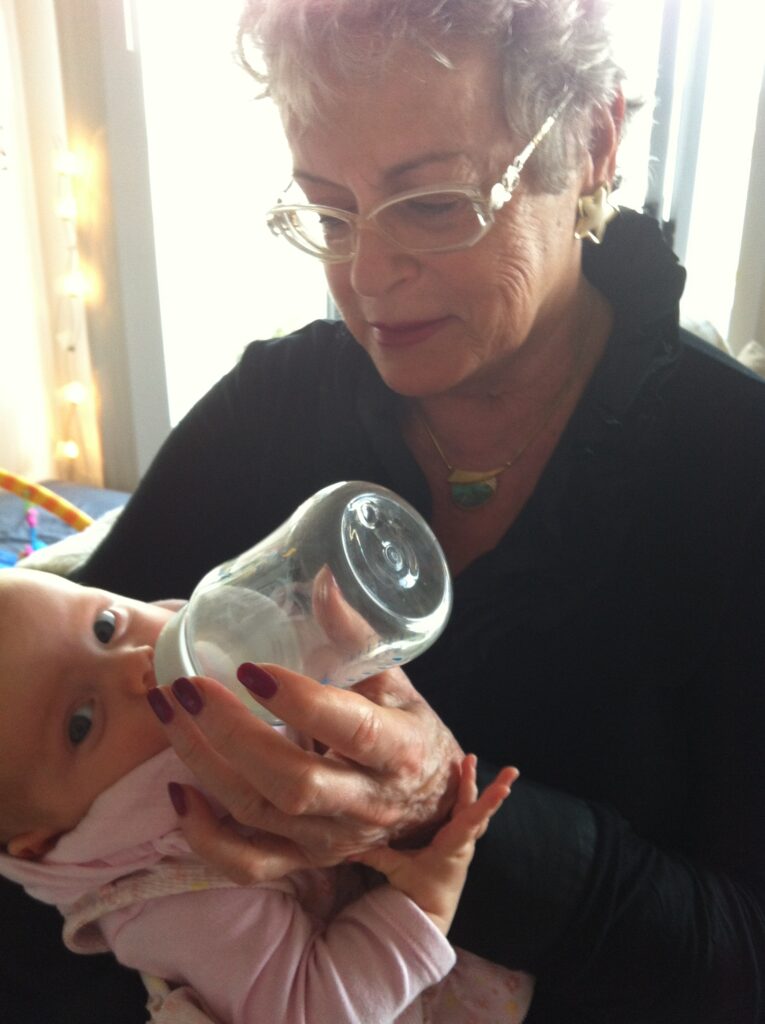
This article was originally published in the Erlenbacher Dorfbott, May 2017
I walk along Bahnhofstraße, past the parish hall, and reach the Erlenbach church. Although I am not religious, I am sometimes drawn there. It is a place of retreat, a place of silence and reflection. I walk through the gate, along with the old and new graves, down the stairs, past the statue of the young girl, and go to the community grave right by the lake. Through the bushes and branches, I can see the vastness of the lake with its mirror-like surface. This is my mother’s final resting place, the place she chose before she died.
Table of Contents
The funeral
I was here for the first time when my mother was buried a little over five years ago. We had arrived from Sydney a few days earlier, from summer to winter. I remember walking as a family from my parents’ home to the church. It was a cold January day, but I didn’t feel much of that. I met familiar faces that I had hardly seen during my 15 years abroad. At 2 p.m. the church bells rang to signal the beginning of the funeral sermon. Even today the church bells remind me of that day. The church was full to bursting. We sat in the front row, in front of us on an easel a picture of my mother. I still couldn’t believe it. It had only been a week since my father called to tell me she had died. I turned around and saw the crowd, all the friends, acquaintances, and relatives who were here to honor my mother.
Mother’s Day without a mother
Soon it will be Mother’s Day again. This day, which is for all mothers, is emotionally complex. On the one hand, because my mother is not here. On the other hand, because I have another daughter besides my bright, soon-to-be six-year-old daughter. One that no one sees and few people remember: her twin sister, who died on the third day after her birth. In the span of four and a half months, I became a mother, a mother without her younger daughter, and a motherless daughter.
…and without a child
My first Mother’s Day five years ago was also my first Mother’s Day without my mother. As a half-orphaned daughter, the well-meaning sayings of Mother’s Day cards burned me like salt on a wound. I became painfully aware that on Mother’s Day my younger daughter would never make a drawing, leap towards me and fall around my neck. It’s a fact I’m still acutely aware of today and one that requires me to take a deep breath. I’m hardly the only one who feels this way. That the mother will eventually die is to be expected. But did you know that one in four pregnancies ends in loss? Losing your baby through miscarriage, stillbirth, or having to bury your child happens more often than you think. Mother’s Day has become so commercialized that it is impossible to avoid it. In my case, it inevitably reminds me of what I no longer have.
Many people carry their grief in silence. Pregnancies, according to the advice of gynecologists, ‘should’ not be told before the 12th week, as the percentage rate of loss drops noticeably in the second trimester. Even if people may not show it so openly – a loss (of one’s own mother or a child) never passes someone by without leaving a trace.
As a psychotherapist, I have been working with people in grief for 15 years. So one might assume that I should have been prepared for the grieving experience. But that knowledge, while it helped me understand my process, had no diminishing effect on the emotional roller coaster I had to go through.
Do you have other children?
The often-asked question, “Does your daughter have any siblings?” is one that I meet with openness and honesty. However, many react helplessly when they hear my story. The reality that my child died in my arms makes people speechless. Infant death is taboo. It does not correspond to the natural sequence when children die before their parents. Parents do not even want to imagine this situation. Some break off the conversation, others avoid me. Few continue to talk and have the courage to ask questions. It is my intent to show them that I am not hurt if they continue to talk or ask questions. I want to encourage people to deal more openly with death and grief. Even if we don’t want to admit it, sooner or later we all have to deal with it.
Since I returned from Australia with my family almost five years ago, we have been living in Erlenbach, my mother’s last home. Living here connects me with her. After a period of adjustment, I feel very comfortable today. I cherish my home and Erlenbach is the place my daughter will remember as her first home. People continue to be present even when they are no longer physically in this world. I have been very aware of this since the death of my daughter and my mother. Perhaps you, who are reading this, know a mother who cannot raise all her children, or a daughter who no longer has a mother. Have the courage to reach out to them.
This coming Mother’s Day, I will walk to the cemetery again. Not out of sadness for the loss, but out of remembrance and gratitude to the mother who contributed a lot to what I am doing with my life.

Leave a Reply